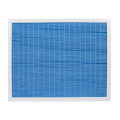Filters with high MERV scores can provide better protection against pollen, pet hair, and bacteria, but they can also impede air flow throughout the system. This can lead to higher energy consumption, HVAC repair bills, and reduced indoor comfort. The MERV scale is used to measure the efficiency of air filters, with low-efficiency filters usually within the MERV 1-4 range and high-efficiency filters being those of the MERV 13 and higher. It's important to note that as the MERV rating increases, the filter becomes more restrictive and more pressure and energy will be needed to expel air.
The MERV scale is not linear; the difference between a MERV 6 and a MERV 8 is almost double in terms of the percentage of particles captured. If you want to remove more material from the air, you can use a filter with a different material. The pores of these filters are much smaller, allowing them to trap more contaminants from the air stream, but it also adds more resistance. Higher MERV filters have greater resistance.
Using an air filter with a MERV rating that is too high is just as bad as using one that is too low. Air filters with higher MERV ratings may filter more, but the thickness of the filter material may restrict airflow. Restricted airflow can reduce comfort, increase energy use, and accelerate the wear and tear of air conditioning components. In particular, using an air filter with a MERV rating that is too high can damage the compressor, heat exchanger, and air conditioner coil. It may seem that they are almost the same, but there are some clear differences between a MERV 8 and a MERV 11 air filter.
If someone has an allergy or a respiratory problem, opt for a MERV 11 air filter or even a MERV 13 air filter. Most likely, a MERV 13 filter will help if the goal is to prevent droplets from passing through. A MERV 8 carbon filter will more than enough filter dust and allergens and will filter dozens of toxic gases that will pass directly through the MERV 13 filter. Since the MERV classification system is standard, it makes it easier to compare filters with different MERV ratings. The Merv 16 would be the best since it would filter 95%.
There's even a YouTube video showing how to make your own N95 with a Merv 16 filter. Each air filter has its pros and cons, but both MERV 8 air filters and MERV 11 air filters are suitable for residential use. One thing to keep in mind is that the MERV 11 air filter may need to be changed a little more frequently than the MERV 8 air filter. If you buy to wash an alcohol, you could very well be creating some strange chemicals unless you're just washing cotton; so it's best to use sunlight to disinfect them - even that could break the tall Merv filters a little and release an unwanted chemical that degassing an activated carbon filter with high Merv could be your best option between you and any other exotic chemical action you're doing. Based on their characteristics mentioned above, a MERV 8 is considered to have higher filtration compared to air filters with a lower MERV rating. A MERV 11 filter only needs to stop 20% of particles smaller than 0.3 to 1.0 microns (three to ten times larger than a COVID-19 particle), while a MERV 12 only needs to stop 35% of particles smaller than 0.3 microns, and a MERV 13 only needs to stop half.
If you're concerned about the effects of inhaling fine air particles, that's another reason to choose a MERV 11 air filter over a MERV 8 air filter. In conclusion, when choosing an air filter for your home or office space it's important to consider both its efficiency in terms of particle capture as well as its ability to allow adequate airflow without restricting it too much. A higher rated filter may provide better protection against allergens and other airborne particles but may also cause increased energy consumption due to restricted airflow.




